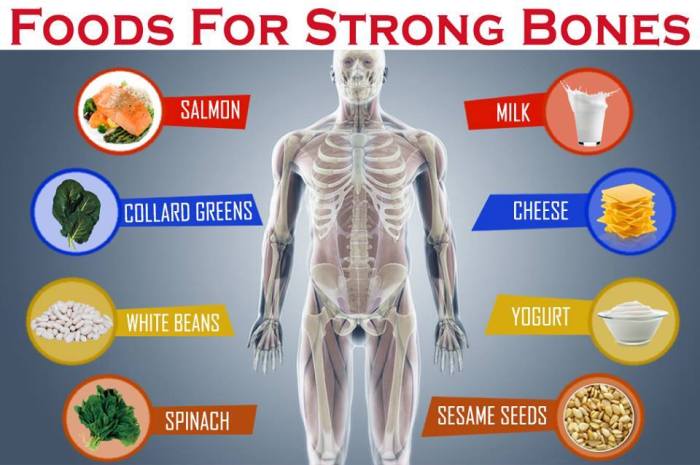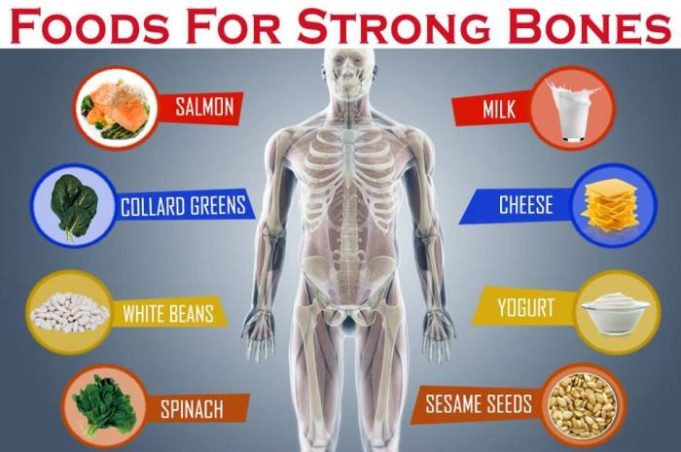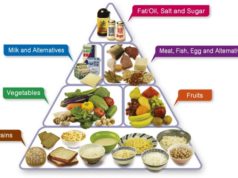Recommended Dietary Allowance for bone health is crucial for maintaining strong and healthy bones throughout life. Bones are living tissues that constantly break down and rebuild, and adequate intake of essential nutrients like calcium and vitamin D is vital for this process. This guide will delve into the recommended dietary allowance for bone health, exploring the importance of these nutrients, factors influencing individual needs, and strategies for achieving optimal bone health.
Understanding the Recommended Dietary Allowance (RDA) for calcium and vitamin D is essential for ensuring adequate bone health. Calcium is the primary mineral found in bones, providing strength and structure. Vitamin D plays a crucial role in calcium absorption, facilitating the body’s ability to utilize calcium effectively. Insufficient intake of either nutrient can lead to weakened bones and increased risk of fractures.
Understanding the Recommended Dietary Allowance (RDA) for Bone Health
The Recommended Dietary Allowance (RDA) for bone health is a crucial guideline for ensuring adequate intake of essential nutrients that support bone growth, development, and maintenance. These recommendations are based on scientific evidence and are designed to meet the needs of most healthy individuals.
Calcium and Vitamin D
Calcium and vitamin D play critical roles in bone metabolism, working together to maintain bone health.
- Calcium is the primary mineral component of bone, contributing to its strength and density. It is involved in various bone processes, including bone formation, mineralization, and resorption.
- Vitamin D, often called the “sunshine vitamin,” acts as a hormone that helps the body absorb calcium from food and regulate calcium levels in the blood. It also plays a role in bone formation and remodeling.
Adequate intake of both calcium and vitamin D is essential for maintaining strong bones throughout life.
Consequences of Inadequate Intake
Insufficient calcium and vitamin D intake can lead to various bone health problems.
- Osteoporosis: This condition weakens bones, making them more susceptible to fractures. Osteoporosis is characterized by low bone mass and deterioration of bone tissue, leading to increased bone fragility.
- Rickets: This condition primarily affects children and is characterized by soft and weak bones due to inadequate calcium and vitamin D absorption. It can lead to bone deformities and growth delays.
- Osteomalacia: This condition affects adults and is similar to rickets, causing bone softening and weakening due to insufficient mineralization.
Inadequate calcium and vitamin D intake can also contribute to other health issues, such as muscle weakness, fatigue, and an increased risk of falls.
Factors Influencing the RDA for Bone Health
The Recommended Dietary Allowance (RDA) for bone health is not a one-size-fits-all value. Several factors can influence an individual’s specific needs, including age, gender, and lifestyle choices.
Age and Gender
The RDA for bone health varies significantly across different life stages, reflecting the changing needs of the body.
- Childhood: During childhood, bone growth is rapid, and the RDA for calcium and vitamin D is higher to support this development. Children need adequate intake of these nutrients to build a strong foundation for bone health later in life.
- Adolescence: Adolescence is a critical period for bone mineral density (BMD) accumulation. The RDA for calcium and vitamin D is elevated during this stage to support peak bone mass development. Adequate intake during this period is essential for preventing osteoporosis and fractures later in life.
- Adulthood: In adulthood, bone growth slows down, and the RDA for calcium and vitamin D gradually decreases. However, maintaining adequate intake is crucial for preserving bone health and preventing age-related bone loss.
- Older Adulthood: As people age, the risk of osteoporosis and fractures increases. The RDA for calcium and vitamin D is often increased in older adults to help slow down bone loss and maintain bone health.
Lifestyle Factors
Lifestyle factors, such as physical activity, smoking, and alcohol consumption, can significantly impact bone health and dietary needs.
- Physical Activity: Regular weight-bearing exercise, such as walking, running, and weightlifting, has been shown to increase bone density and reduce the risk of osteoporosis. Engaging in physical activity can help stimulate bone growth and improve bone strength.
- Smoking: Smoking has a detrimental effect on bone health. It can decrease bone density and increase the risk of fractures. Smoking also interferes with the body’s ability to absorb calcium and vitamin D, further impacting bone health.
- Alcohol Consumption: Excessive alcohol consumption can negatively impact bone health by interfering with calcium absorption and increasing the risk of falls. It can also lead to malnutrition, further contributing to bone loss.
Dietary Sources of Nutrients for Bone Health

Obtaining the recommended daily allowance of calcium and vitamin D for bone health is achievable through a balanced diet rich in various food sources. These nutrients play crucial roles in maintaining bone density and strength, reducing the risk of osteoporosis and fractures.
Maintaining strong bones is crucial throughout life, especially during pregnancy. The Recommended Dietary Allowance for bone health includes sufficient calcium and vitamin D, which are essential for fetal bone development. You can find detailed information about the specific nutrient needs during pregnancy, including increased calcium and vitamin D requirements, on the Recommended Dietary Allowance for pregnant women website.
By understanding these dietary needs, pregnant women can ensure their own bone health while supporting the healthy growth of their baby.
Food Sources Rich in Calcium and Vitamin D
A diverse range of foods can provide the necessary calcium and vitamin D for optimal bone health. The following table highlights some common food sources, along with their approximate calcium and vitamin D content:
| Food Type | Calcium (mg) per serving | Vitamin D (IU) per serving |
|---|---|---|
| Milk (1 cup) | 300 | 100 |
| Yogurt (1 cup) | 300 | 100 |
| Cheese (1 oz) | 200 | 10 |
| Salmon (3 oz) | 100 | 400 |
| Tofu (1/2 cup) | 200 | 0 |
| Spinach (1 cup) | 250 | 0 |
| Almonds (1/4 cup) | 75 | 0 |
It is important to note that these are just examples, and the actual content may vary depending on the specific brand and preparation method.
Calcium and vitamin D are crucial for strong bones, especially as we age. While these nutrients are essential for everyone, the recommended dietary allowance for athletes may be higher due to the increased stress on their bones. You can find more information about the specific needs of athletes in terms of dietary intake here , which can also help inform your own dietary choices for optimal bone health.
Sample Meal Plan for Bone Health
Here is a sample meal plan that incorporates foods rich in calcium and vitamin D to meet the RDA for bone health:
- Breakfast: Oatmeal with berries and a glass of fortified milk.
- Lunch: Salad with grilled salmon, spinach, and a side of yogurt.
- Dinner: Tofu stir-fry with vegetables and a side of brown rice.
- Snacks: Almonds, cheese cubes, or a glass of fortified orange juice.
This meal plan provides a balanced intake of calcium and vitamin D, ensuring adequate bone health. It is important to note that this is just a sample, and individual needs may vary. Consult with a healthcare professional or registered dietitian for personalized dietary recommendations.
Role of Dietary Supplements
Dietary supplements can play a role in fulfilling the RDA for bone health, particularly for individuals who struggle to meet their calcium and vitamin D needs through diet alone. However, it is crucial to consult with a healthcare professional before taking any supplements, as excessive intake can lead to adverse effects.
Getting enough calcium and vitamin D is crucial for strong bones, but your dietary needs go beyond just those two nutrients. Factors like age, activity level, and even pregnancy can influence your overall nutritional requirements. To learn more about how your lifestyle affects your Recommended Dietary Allowance, check out this comprehensive guide on Recommended Dietary Allowance for different lifestyles.
Understanding these personalized needs can help you tailor your diet for optimal bone health and overall well-being.
Supplements should be considered as an adjunct to a healthy diet, not a replacement for it. It is always preferable to obtain nutrients from whole food sources whenever possible, as they provide a broader spectrum of essential vitamins, minerals, and antioxidants.
Strategies for Achieving the RDA for Bone Health: Recommended Dietary Allowance For Bone Health
Meeting the Recommended Dietary Allowance (RDA) for bone health is crucial for maintaining strong bones and reducing the risk of fractures. This involves incorporating bone-healthy foods into your daily diet and making lifestyle changes that promote bone health.
Incorporating Bone-Healthy Foods into Daily Meals and Snacks
Making simple changes to your diet can significantly increase your intake of calcium and vitamin D, the two most important nutrients for bone health. Here are some practical strategies:
- Start your day with calcium-rich breakfast options: Begin your day with a bowl of fortified cereal with milk, yogurt with fruit, or calcium-enriched orange juice. These options provide a good dose of calcium to kickstart your day.
- Include dairy products in your meals: Incorporate cheese, milk, and yogurt into your lunch and dinner. Choose low-fat or fat-free options to reduce calorie intake.
- Choose calcium-rich snacks: Opt for almonds, cheese cubes, or a glass of milk as healthy snacks throughout the day.
- Add leafy greens to your meals: Include spinach, kale, and collard greens in salads, soups, and stir-fries. These greens are rich in calcium and other essential nutrients.
- Choose fortified foods: Look for fortified plant-based milk alternatives, orange juice, and cereals that are enriched with calcium and vitamin D.
Increasing Calcium and Vitamin D Intake Through Dietary Choices, Recommended Dietary Allowance for bone health
While calcium and vitamin D are essential for bone health, many people do not consume enough of these nutrients through their diet. Here are some tips to increase your intake:
- Choose dairy products wisely: Opt for low-fat or fat-free dairy products, such as milk, yogurt, and cheese, to reduce calorie intake while maintaining calcium levels.
- Consume fatty fish: Salmon, tuna, and mackerel are excellent sources of vitamin D. Aim for at least two servings of fatty fish per week.
- Add fortified foods to your diet: Include fortified plant-based milk alternatives, orange juice, and cereals in your diet. These options are often enriched with calcium and vitamin D.
- Expose yourself to sunlight: Sunlight helps your body produce vitamin D. Aim for 15-20 minutes of sun exposure per day, without sunscreen, to boost your vitamin D levels.
- Consider supplements: If you are concerned about meeting your calcium and vitamin D needs through diet alone, talk to your doctor about taking supplements.
Optimizing Bone Health Through a Balanced Diet and Lifestyle
A balanced diet and healthy lifestyle are crucial for maintaining strong bones. Here are some tips to optimize your bone health:
- Consume a balanced diet: Ensure your diet includes a variety of fruits, vegetables, whole grains, and lean protein sources. This provides your body with the essential nutrients it needs for bone health.
- Engage in regular weight-bearing exercise: Activities such as walking, running, dancing, and weightlifting put stress on your bones, which helps to strengthen them. Aim for at least 30 minutes of moderate-intensity exercise most days of the week.
- Maintain a healthy weight: Excess weight puts extra stress on your bones, increasing the risk of fractures. Aim to maintain a healthy weight through a balanced diet and regular exercise.
- Avoid smoking: Smoking can damage bone tissue and increase the risk of osteoporosis. Quitting smoking is one of the best things you can do for your bone health.
- Limit alcohol consumption: Excessive alcohol intake can interfere with calcium absorption and increase the risk of bone loss. Limit your alcohol consumption to moderate levels.
Conditions Affecting Bone Health and Dietary Needs
Certain medical conditions can significantly impact bone health and necessitate specific dietary adjustments. Understanding these conditions and their associated dietary needs is crucial for maintaining optimal bone health.
Osteoporosis
Osteoporosis is a condition characterized by low bone mass and density, making bones fragile and prone to fractures. This condition affects millions worldwide, primarily older adults, but it can also occur in younger individuals due to various factors.
Dietary Recommendations for Osteoporosis
A diet rich in calcium and vitamin D is essential for individuals with osteoporosis. Calcium is the primary building block of bones, while vitamin D helps the body absorb calcium.
- Calcium: Aim for at least 1,200 milligrams of calcium per day. Include calcium-rich foods like dairy products (milk, yogurt, cheese), leafy green vegetables (kale, spinach, collard greens), fortified foods (orange juice, plant-based milk), and calcium supplements if necessary.
- Vitamin D: Aim for 600 IU (international units) of vitamin D per day. Get vitamin D from sunlight exposure, fatty fish (salmon, tuna, mackerel), egg yolks, and fortified foods (milk, yogurt, cereal).
- Other Nutrients: Include other nutrients essential for bone health, such as vitamin K, magnesium, and phosphorus, in your diet. These nutrients play crucial roles in bone formation and maintenance.
Osteomalacia
Osteomalacia is a condition characterized by soft and weak bones due to inadequate mineralization, resulting from vitamin D deficiency. This deficiency can lead to pain, muscle weakness, and bone fractures.
Dietary Recommendations for Osteomalacia
A diet rich in vitamin D and calcium is essential for individuals with osteomalacia.
- Vitamin D: Aim for 800 IU of vitamin D per day. Get vitamin D from sunlight exposure, fatty fish, egg yolks, and fortified foods. Consider vitamin D supplements if necessary, as advised by your doctor.
- Calcium: Aim for at least 1,000 milligrams of calcium per day. Include calcium-rich foods like dairy products, leafy green vegetables, fortified foods, and calcium supplements as needed.
- Other Nutrients: Include other nutrients essential for bone health, such as vitamin K, magnesium, and phosphorus, in your diet.
Consulting a Healthcare Professional
It is crucial to consult with a healthcare professional for personalized dietary advice, especially if you have a bone health condition. They can assess your individual needs, consider any underlying medical conditions, and recommend appropriate dietary interventions. They can also help you determine the appropriate dosage of calcium and vitamin D supplements if necessary.
























